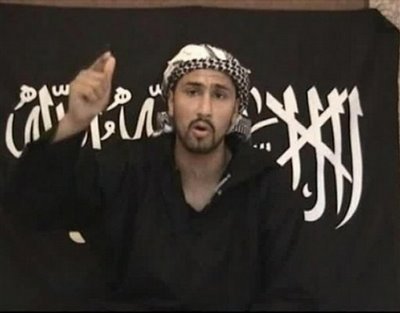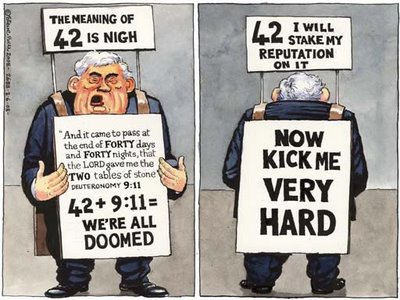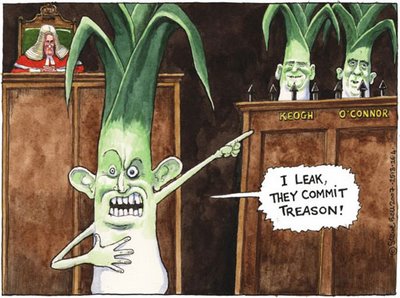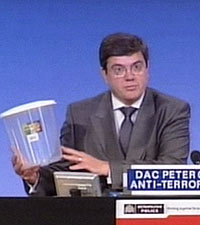 You'd have to say that the response to the ignominious end of the "liquid bomb" plot trial has been little short of remarkable. I've just finished watching the Panorama special on the plotters, produced with an incredible amount of co-operation with both the police and the security services, which was most likely sitting there waiting to be shown as soon as the jury reached their decision, no doubt hastily re-edited yesterday and today to be in line with the conviction of only three and then not for conspiracy to cause murder through explosions on planes.
You'd have to say that the response to the ignominious end of the "liquid bomb" plot trial has been little short of remarkable. I've just finished watching the Panorama special on the plotters, produced with an incredible amount of co-operation with both the police and the security services, which was most likely sitting there waiting to be shown as soon as the jury reached their decision, no doubt hastily re-edited yesterday and today to be in line with the conviction of only three and then not for conspiracy to cause murder through explosions on planes.
It, like almost all the rest of the media, didn't question in any great detail the idea that the plotters could have pulled off the plans that we're told they had in mind, because again, there was little to no evidence presented that they themselves knew what the targets were going to be, and very little dispute that they were almost ready to go. The evidence for the targeting of planes amounts to, as mentioned yesterday, the fact that one of plotters had downloaded information of transatlantic flights to his memory stick, the details from the diary which suggested getting the devices through security, most likely airport security, and that two of the plotters were heard discussing different holiday destinations in line with which were the most popular for British tourists. The questioning of the readiness of the devices themselves amounted to the presenter Peter Taylor asking a government scientist whether what the suspects planned was possible. Mindful of his words and being as non-committal as possible, he said yes, and said that it would have been possible to blow an airplane out of the sky with one of the bombs in a bottle.
Just in case we didn't get that, shown on news bulletins throughout the day on the BBC has been their own experiment using a bomb apparently made to the same specifications being placed inside the hull of an aircraft. It explodes, and punctures the hull successfully, which you can see here. The problem with this is the same as with the other government tests shown to the jury: that these are professionals with experience of what they're doing with the best available materials. It also doesn't take into account the circumstances in which the bombers would be working: the bomb made for the BBC appears to have been put together almost on the spot, something that the bombers would not have done. As Charlieman points out on Liberal Conspiracy, TATP is incredibly volatile and begins to degrade very quickly. This was part of the reason why the 21/7 bombers' devices failed. The liquid bomb plot would have involved even higher dilutions of the hydrogen peroxide, increasing drastically the danger of it going off prematurely while also decreasing its "shelf-life". Additionally, it's by no means certain that such a bomb on board an aircraft would even then have the catastrophic consequences which the police and politicians claimed it would: only recently we saw the consequences of the explosive decompression on the Qantas flight, which managed to land safely. An even worse ED was suffered on Aloha Airlines Flight 243, which also managed to land with the loss of just one person and injuries to 60 others. One of the few other new facts added by the Panorama documentary was that Sarwar, the alleged bomb maker, had successfully boiled down some of the HP to the right dilution. Again though, the programme didn't bother to point that the bombs had still to assembled, that they had not constructed a viable device and that when you consider the difficulty involved in doing so they were still a long way from creating just one, let alone the 7 which the prosecution claimed there would be.
It isn't just however the security services and the police that found the verdict of the jury "astonishing", as spooks' friend Frank Gardner put it, it's also been sections of the media who are incredulous at them not convicting all the men for their obvious murderous ambitions. The Times for one went absolutely overboard, not just enlisting Peter Clarke for an tendentious article on how the "surveillance society" works just wonderfully, but also their lead article, which includes this nugget:
The jury’s indecision in the face of a detailed Crown case raises questions about the public perception of the terror threat that could undermine government attempts to introduce further security legislation.
They just don't seem to get it, do they? You could apply that reasoning to both the hacks and the public. We're told by the Times, Peter Clarke and the security services that this was "strong evidence", "a detailed Crown case" and "the strongest terrorism case ever presented to a court", but they seem to have started believing their own hype. Yes, there was a very strong case here for the men being involved in some sort of terrorist plot, which is why three of them have been convicted of conspiracy to murder, and will likely be sentenced to very long terms of imprisonment, in line with the likes of Dhiren Barot, who had even more laughable plans than those of the non-existent ricin crew. There was however very little hard evidence that planes were the targets, as has been discussed. What seems to have happened is similar to that in cases of miscarriages of justice: the briefers have been out briefing and the journalists' sources have been whispering furiously into ears about the obvious guilt of those on trial, and when it doesn't go according to plan, they respond by blaming everyone other than themselves, with the journalists also flummoxed.
Hence along with the Americans getting the blame for ordering the arrest of Rauf, also being fingered are the jury themselves. The fact that there was a two-week break in proceedings for holidays, that some members of the jury were sick and otherwise is regarded as significant enough to be commented upon, especially by the Daily Mail, referring to it as a "farce". That those involved have given up nearly six months of their lives to hear an incredibly difficult case and then have to come up with a verdict is of no consequence; since they've come to the wrong one they're apparently fair game. They're also hardly likely to be able to defend themselves, as the only jury members I can recall speaking out recently were some of those involved in the ricin case after those acquitted were subjected to control orders, and then some of those involved in the original case involving Barry George, who had changed their minds over time.
It's perhaps a little over-the-top to be concerned immediately about the prospect of jury trials in terrorist cases being curtailed as a result of this verdict, but what if another jury also fails to find the men guilty of conspiring to cause explosions on planes? As the Times also reports, the man completely acquitted of all the charges, Mohammed Gulzar, is now likely to be given a control order. That's justice for you: a jury finds you not guilty but the state with its secret evidence tribunals disregards that entirely. I'm sure I won't be the only one to find potential menace also in the words of Peter Clarke, especially in these two paragraphs:
Take this case. To save the lives of the innocent and convict the would-be killers we used all the tools in the security armoury. Deeply intrusive surveillance, informants, CCTV, DNA, telephone call data and so on. This was not about collecting information for its own sake - it was to secure evidence to put before a court.
Some critics fail to understand that sophisticated, modern evidence gathering has allowed the most complex terrorist conspiracies to be tried in our criminal courts in front of a jury. No need for military commissions or the juryless Diplock courts of Northern Ireland.
And yet despite all of this evidence the jury were still failed to be convinced that planes were the targets. In any event, what Clarke is describing is a false dichotomy between surveillance and security; nothing that the police did broke the current rules as they were, and in fact, in their breaking into the "bomb factory" and planting bugs and live cameras they were using the oldest tricks in the book. It's the implication though in the second paragraph which both needles and worries. To begin with, it's not as if we're some wonderful place where every alleged terrorist is subjected to a court trial: just above we mentioned that Gulzar is likely to be given a control order, where the evidence against him will be heard in secret and not given to his lawyers. It wasn't so long back that we were locking foreign suspects up indefinitely without charge, and Clarke himself was at the forefront of pushing for support for 42 days detention without charge. What though if ever more complex cases keep coming before juries and they keep failing to reach the "correct" result? Are we really so potentially far away from military commissions or Diplock style courts? After all, juries in some fraud trials are already mooted to be abolished. Just how many more cases like yesterday's will it take before populist politicians with an eye on the standard of debate in the tabloids decide that this "farce" should be brought to an end?
Clarke continues:
And what if we had failed? What if the prosecution case was right, and half a dozen American airliners were to be brought down by British terrorists, operating from Britain and in effect using the UK as a launch pad for an attack on the United States? What would have happened to the UK and indeed the global economy? What would the impact have been on UK/US relations? What about the pressure it would have placed on Muslims in the UK? A very senior politician, at the time of the arrests, told me he thought it could have led to a breakdown in the community cohesion that had survived the attacks in 2005.
But these are all suppositions. The security services and police had been aware of these men and were documenting their every movement. There was never the slightest possibility they were going to be allowed to even take the first steps towards actually carrying out an atrocity. The only reason the arrests were brought forward was because of Rauf's arrest, and the possibility of the disruption of the plot. Less plausible is something Clarke says at the beginning of the article:
More worrying still, if they were tipped off to the arrest they might panic and mount a desperate attack.
As we have seen though, the devices simply weren't anywhere near ready, and even if they had the right amounts of diluted HP, there's still no indication that their attempts at constructing the bombs in full would have been any more successful than the government scientists' ones. And please, Clarke really should spare us the spurious concern for community cohesion: he was directly involved in the Forest Gate raid, which did more damage to the rapport with British Muslims and the actions of some in their communities than anything else has.
Should the restrictions now be lifted on liquids then, as Virgin Atlantic has called for? While as I've attempted to document, the dangers are vastly overstated and the problems involved in creating liquid explosives are manifold, I still think it's probably right for the moment for caution to be erred on, although the limit could perhaps be lifted from 100ml bottles to 250ml or above, and the idea that babies' bottles could be used is ridiculous.
Most of all however, the conclusion of this case should not cause panic amongst politicians or security agencies as to whether the public has become blase towards the terrorist threat. They clearly haven't. What is apparent however is that many are increasingly concerned about the febrile exaggeration of such cases, including this one and the claims of mass-murder on an unimaginable scale which simply are not backed up by the facts, and which is often for short-term political gain. The Panorama documentary also completely established that John Reid had long been aware of the "plot", meaning that his speech damning civil libertarians for not getting it just the day before the arrests was cynicism of the absolute worst kind. We don't like it when concerns about terrorism lead jumped-up police officers and community support staff to order people not to take photographs of public buildings, and we also don't like it when the threat of terror is used wholesale to justify the removal of ever more liberties, as the failure to reach a verdict in this trial could yet do. There is a terrorist threat, but it's not going to lead to the demise of this nation, and it doesn't even begin to amount to the that posed either by the Nazis in 1940 or to the Soviet Union during the height of the cold war. The same newspapers and media which want us to be scared are the same ones, ironically, that want us at the same time to have Churchillian resolve in the face of it. We need neither, and that has to be emphasised.Labels: Abdulla Ahmed Ali, al-Qaida, civil liberties, jihadists, John Reid, liquid bombs plot, media reporting, Panorama, Peter Clarke, Peter Taylor, security services, terror, terror suspects





